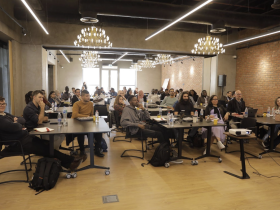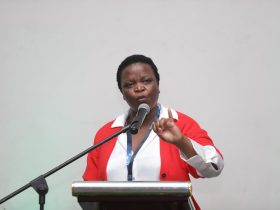We all need to travel. We take taxis, trains, flights or e-hailing services daily to get to our desired destinations. And when we are travelling, there is always music being played in public transport modes. Music helps us relax while we pass time in transit.
There are more than 25 000 buses, over 150 000 minibus taxi’s, 280 train sets, and numerous other forms of public transport around the country. All these transport businesses make use of music in their vehicles while they are working hard to help us get from A to B. However, we rarely think about who created the music, how much work went into creating the music, and how those music creators make a living.
While many think that writing a song just requires an idea to be written down, producing a song takes weeks from concept to completion, and involves numerous people from composers and lyricists to publishers, promoters and distributors. As with the time and petrol it costs to make a journey, SAMRO’s members work tirelessly to provide the music that calms the nervous passenger and excites the bored commuter during their journeys. And through licensing music, these members can be paid royalties for their hard work.
So, whenever an original song is broadcast, played or performed in public, including public transport, the rights holders in that work should earn royalty income.
October is Transport Month and the Department of Transport uses this month to raise awareness of the importance of transport within the economy. The department encourages both business and civil society to participate in the provision of a safe, affordable, accessible, and reliable transport system in the country.
While the transport department calls for compliance by transporters, the Southern African Music Rights Organisation (SAMRO) is driving compliance with copyright laws in the public transporters’ sector.
SAMRO calls on all public transporters including e-haling services, taxis, buses, and airlines to adhere to the copyright laws, which require them to be licensed to play music for their passengers. “We don’t make the rules, it’s all laid out in the Copyright Act and it is part of South African law,” clarified Nicholas Maweni, Chairperson of SAMRO.
SAMRO requests a Music and Transport stakeholder Indaba
“As we celebrate Transport Month, it is important for all transport owners to be cognisant and to comply with the copyright laws as they relate to music and not to infringe on the rights of musicians by playing music without a license,” says Nicholas Maweni.
Maweni says SAMRO aims to create awareness about the obligations of the transport sector in adhering to copyright laws as they relate to music. He said it is SAMRO’s responsibility to drive compliance by ensuring that no sector is left behind.
“As Africa’s leading Collection Management Organisation (CMO), SAMRO calls upon Minister of Transport Fikile Mbalula to convene a Stakeholder Indaba to assist the transport sector in understanding their responsibility to copyright holders.” The proposed Indaba would be to facilitate the dialogue between the music and transport sectors and find a path of mutual understanding and expectation as it relates to copyright law.
Copyright Infringement
When a musician creates a song, lyrics, or musical score; they own the intellectual property to that work. Should someone use those works without permission, or without proper music licensing, they are infringing on the creators’ copyright ownership.
SAMRO aims to ensure that SAMRO members do not lose their revenue through the improper use of unlicensed music. To eliminate the potential copyright liability, the best way in which the public transport sector can comply with the copyright law is by obtaining a licence from SAMRO.
SAMRO is constantly seeking ways to support and protect the well-being of its members as well as ensure that they are compensated fairly for their work.
























Leave a Reply